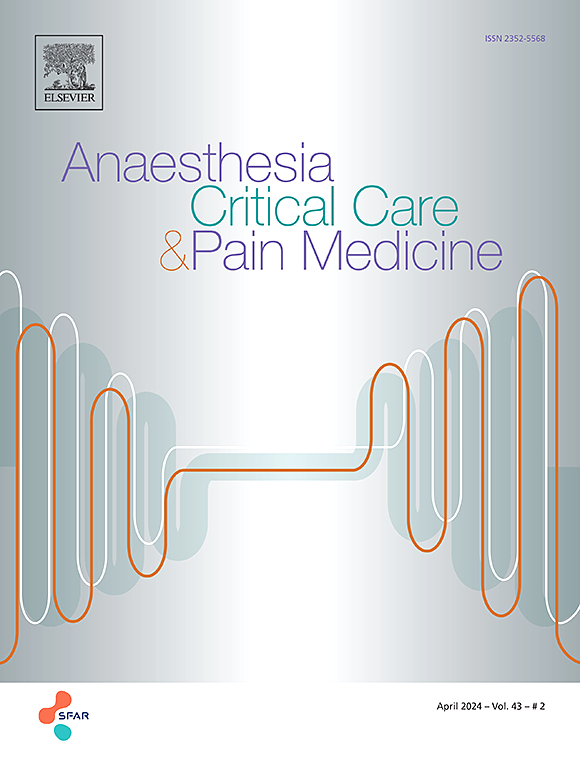围手术期促红细胞生成素对心脏手术术后发病率和死亡率的影响:随机对照试验荟萃分析。
IF 3.7
3区 医学
Q1 ANESTHESIOLOGY
引用次数: 0
摘要
目的:众所周知,心脏手术的围手术期红细胞(RBC)输注率很高,这与术后死亡率和发病率的增加有关。围手术期促红细胞生成素(EPO)被认为可降低围手术期红细胞输注率,但其对术后发病率或死亡率的影响尚不清楚:已登记的研究方案可在 PROSPERO (CRD42022314538) 上查阅。我们在 Pubmed、EMbase 和 Cochrane CENTRAL 数据库中检索了心脏手术中 EPO 的随机对照试验 (RCT)。研究结果包括短期死亡率、急性肾损伤(AKI)、再次手术、脑血管意外(CVA)、围手术期心肌梗死(MI)、感染性并发症和红细胞输注。结果:共纳入了 21 项关于围手术期 EPO 的研究:结果:共纳入 21 项 RCT 研究(n = 2,763 名患者)。死亡率分析包括 17 项研究(EPO 1,272 例患者,对照组 1,235 例),结果显示两者无显著差异(风险差异 (RD) 0.0004,95%CI:-0.016, 0.009)。EPO 并未降低 AKI(RD -0.006,95% CI:-0.038,0.026)和再次手术(RD 0.001,95% CI:-0.013,0.015)的发生率。两组间CVA(RD -0.004,95% CI:-0.015,0.007)和围手术期心肌梗死(RD -0.008,95% CI:-0.021,0.005)的发生率相似:结论:尽管 EPO 已被证实可减少围手术期红细胞输注,但我们并未发现它能降低术后短期死亡率、AKI 和再次手术的发生率。研究结果表明,围手术期使用 EPO 也是安全的,血栓事件(包括 CVA 和围手术期心肌梗死)不会增加。本文章由计算机程序翻译,如有差异,请以英文原文为准。
Effect of perioperative erythropoietin on postoperative morbidity and mortality after cardiac surgery: a meta-analysis of randomized controlled trials
Objective
Cardiac surgery is known to have high rates of perioperative red blood cell (RBC) transfusions which are associated with increased postoperative mortality and morbidity. Perioperative erythropoietin (EPO) has been suggested to lower perioperative RBC transfusions, and the effect on postoperative morbidity or mortality is unknown.
Methods
The registered study protocol is available on PROSPERO (CRD42022314538). We searched the Pubmed, EMbase, and Cochrane CENTRAL databases for randomized controlled trials (RCT) of EPO in cardiac surgery. Outcomes were short-term mortality, acute kidney injury (AKI), re-operation, cerebrovascular accident (CVA), perioperative myocardial infarction (MI), infectious complications, and RBC transfusions. RCT studies of perioperative EPO that reported at least one prespecified outcome of interest were included.
Results
A total of 21 RCT’s (n = 2,763 patients) were included. Mortality analysis included 17 studies (EPO 1,272 patients, control 1,235) and showed no significant difference (risk difference (RD) 0.0004, 95%CI: −0.016, 0.009). EPO did not reduce the incidence of AKI (RD −0.006, 95% CI: −0.038, 0.026) and reoperation (RD 0.001, 95% CI: −0.013, 0.015). The incidence of CVA (RD −0.004, 95% CI: −0.015, 0.007) and perioperative MI (RD −0.008, 95% CI: −0.021, 0.005) was similar between the groups.
Conclusions
Although EPO had been proven to reduce perioperative RBC transfusions, we did not find that it reduces the incidence of postoperative short-term mortality, AKI, and reoperation. The study results support that perioperative EPO is also safe, with no rise in thrombotic events, including CVA and perioperative MI.
求助全文
通过发布文献求助,成功后即可免费获取论文全文。
去求助
来源期刊

Anaesthesia Critical Care & Pain Medicine
ANESTHESIOLOGY-
CiteScore
6.70
自引率
5.50%
发文量
150
审稿时长
18 days
期刊介绍:
Anaesthesia, Critical Care & Pain Medicine (formerly Annales Françaises d''Anesthésie et de Réanimation) publishes in English the highest quality original material, both scientific and clinical, on all aspects of anaesthesia, critical care & pain medicine.
 求助内容:
求助内容: 应助结果提醒方式:
应助结果提醒方式:


